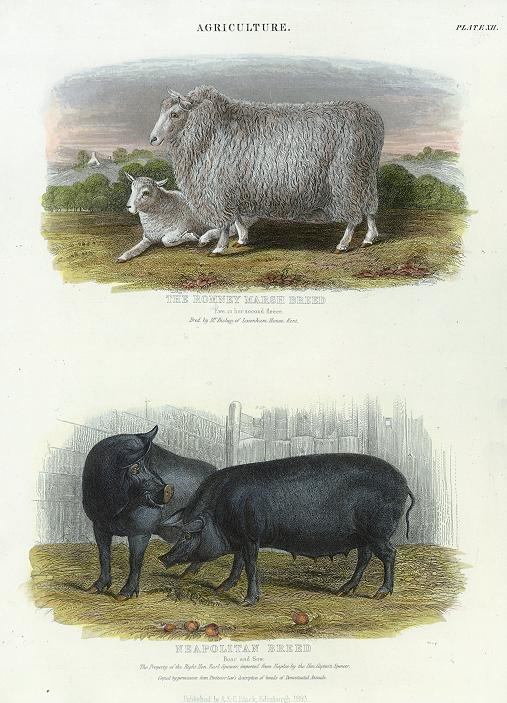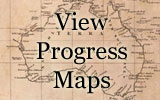In South Australia
Colonel Light is under increasing pressure to identify the site for the capital and begin his detailed land surveys. He is acutely aware of the impatience of the emigrants camped at Holdfast Bay and knows that they will soon be joined by hundreds more from the Buffalo. But he has been instructed to examine Port Lincoln as a potential city site and to consult with the governor, who has not yet arrived, before making his final choice. It is an impossible situation.
On 27 November he walks inland with Finniss ‘as far as the third range of hills’ to inspect the area he has been surveying and is once again pleased with what he sees. ‘I was delighted to find the tops of the highest hills composed of excellent soil, and quite moist’, he confides to his diary. He feels he can safely leave the survey to Finniss while he visits Port Lincoln. The next day he makes a first attempt to leave for Port Lincoln, but is frustrated by calm weather. It will be 2 December before he can finally get underway. The following day he stands off outside the harbour at Port Lincoln, but once again the winds and tides conspire against him. It is a tricky entry point, with a dangerous reef nearby. We leave him on 3 December still standing off Port Lincoln, chafing at still further delay.
At the Holdfast Bay settlement the settlers are in for an exciting week. They have their first experience of fire in their new home and learn that it is a dangerous and unpredictable tool. Kingston ordered the fires lit to clear away grass and undergrowth and make surveying easier, but the wind fanned the flames in the direction of the settlement and both Gouger and Mary Thomas pass an anxious night, afraid that the fire might engulf their tents. Some of the fires ‘came so close to us that I began to be alarmed’, Mary Thomas records, ‘for the wind drove the flames with amazing rapidity, and the grass being perfectly dry, the fires burnt with such fury as is scarcely credible’. Afterwards, ‘all beyond is black and desert’, Robert Gouger records, but he hopes that the fire might at least have driven the insects away. Faint hope!
The colonists also make their first acquaintance with two members of the {tooltip} Kaurna group {end-text}The Indigenous people of the Adelaide Plain {end-tooltip}, a man and his son, who emigrant William Williams encounters nearby. Although apprehensive, Williams is careful to signal that he means no harm, and manages to persuade the Kaurna to accompany him back to the settlement. Robert Gouger describes what happens next, as both groups try to understand each other. Williams offers the man and his son food – sugar, biscuit and tobacco – then Gouger presents them with some second hand uniforms, ‘which wonderfully delighted them’. We have to assume that these things were brought along for just this purpose, since this was also Light’s approach at Rapid Bay. We know how both Gouger and Mary Thomas felt about this first encounter, since we have their separate accounts of the event, but can only guess at the thoughts of the Kaurna man and boy. It emerged later that the Kaurna had observed the Africaine‘s arrival, but had deliberately ‘kept aloof’. They may have known from members of the Rapid Bay tribe that the settlers intended them no immediate harm, but what they thought of the invasion of their lands we cannot know. These settler accounts suggest that some of the Kaurna welcomed the newcomers and ‘looked at each of the party as if impressed with awe at our superior knowledge’, but others might well have thought the invaders foolish, especially when they observed their misguided experiments with fire. In their comments both Mary Thomas and Robert Gouger reflect the preconceptions of the ‘savage’ they brought with them, although Mary in particular is quick to praise the obvious intelligence of the two Kaurna they meet, and is happy later to learn fire lighting techniques from others who observed her incompetent attempts with great amusement.
In Rapid Bay meanwhile Dr Woodforde celebrates his 26th birthday on a ‘piping hot’ November day. Mrs Lipson kindly makes him a cake, which he shares with the surveying party. But on Kangaroo Island John Brown’s little establishment is faring poorly. They dig three new wells, but all are salty. The stock is also growing thinner by the day on the poor quality feed and several seem to be struck down after eating poison plants. It will be some years before the culprit can be identified. Faced with the probable loss of all of the company’s stock, Samuel Stephens decides to transfer the survivors to the mainland on the Emma.

At sea
The Buffalo is now in the middle of the Indian Ocean, on a straight course for southern Australia. As far as George Stevenson is concerned, Captain (Governor) Hindmarsh can do nothing right and he implies that this view is held by most on board. Resident Commissioner Fisher is said to be of a like mind, but Fisher has problems of his own. He has another epileptic fit this week, his condition perhaps exacerbated by the general tension Hindmarsh seems to generate on board.
Stevenson is still busily drafting legislation. This week he proposes a law ‘for preventing unnecessary litigation & for the amicable settlement of all disputes by arbitration’, imitating a practice in use in Denmark. A court of arbitration would have been a far sighted innovation. Below decks meanwhile another little emigrant is born, to Mrs Walker. She has a son.


Comments or Questions: